Identify Yourself as a Soul with a Body
A person who identifies himself with his soul will take good care of his body to keep it safe and healthy, but he will keep his main focus on nourishing his soul. A person who sees himself as being a soul, someone who has a body just for the duration of his stay on this planet, will tend to view other people as essentially being souls also. This will raise his view of others. He will automatically treat others with greater respect.
The more you see yourself as a soul with a body, the higher your self-image will be. Who am I? "I am a soul who is living in this world within my body."
When you don't know what to do, ask yourself, "What course of action would my soul want me to choose?"
Love Yehuda Lave
8 Things You Should Never Say to Your Spouse
Refraining from saying certain things is just as important as what we say.
by Sara Debbie GutfreundWe didn't know the newlywed couple very well but friends of ours had asked us to invite them over. It took less than a minute of dinner table conversation to see that they weren't getting along very well.
When I asked them how they met, they immediately launched into an argument about it. That's not how it happened. Yes, it is. No it's not. You're wrong. I asked you to stop saying that to me all the time.
At first my husband and I just sat there in a state of mild shock and growing discomfort. Then I tried interrupting them: "Um, guys, it's okay. It doesn't really matter how you met. Do you want some rugelach maybe?"
They turned to look at me in surprise and then the husband said, as the wife simultaneously reached out for a chocolate rugelach: "No thanks, we're watching our weight." He then glared at his new wife as she ate.
"I think I'll go get some fruit for everyone," I said brightly.
"I'll help you," my husband said quickly, and we escaped to the kitchen to try to figure out what to do.
Sometimes a couple descends into this cycle of hostility and bickering because they don't know how to communicate with each other. Refraining from saying certain things is just as important as what we say. Here are the top eight things we should never say to our spouses.
-
"What is wrong with you?" This is often said in moments of frustration, but instead of getting our spouses to recognize something they did wrong, this question implies that they are inherently flawed. It causes pain that can linger even after it is forgiven.
-
"Forget it, I'll do it myself." This communicates to our spouses that we have no patience for them, doubt their competence and on top of that, want to make them feel badly about their failure to complete a task.
-
"You never _____ or you always _____." The words never and always should be used only if they are accurate. He is 'always' a hundred percent of the time late? She 'never' appreciates him? Besides being imprecise, these words usually decrease a person's motivation to change and create additional resentment.
-
"That's all you bought/did/made?" If you are dissatisfied with something your spouse did, take a step back. Consider how hard they worked on it and instead of attacking them, first appreciate what they did do by thanking them. Then you can explain that you had a different expectation and discuss how to handle the situation.
-
"But you did the same thing." This is usually said when a spouse expresses that he was hurt by something, and instead of apologizing we go right into defense mode. And say things like "but that's what you do to me " or "you did the exact same thing." Even if it's true, it's not helpful or relevant. Apologize and move on.
-
"Whatever." Some of us think that this expression conveys that we are flexible and laid back. But answering a spouse's question this way just basically says "I don't care about you or what you are asking me." Give a real answer and appreciate that you are being asked.
-
"We never go anywhere or do anything." Besides the presence of the unhelpful "never" in this sentence, there is also implied blame. If you want to go somewhere or do something fun with your spouse then suggest some ideas and plan together. Don't place all the responsibility onto your spouse. It's not her or his job to entertain you.
-
"Why can't you be more like ____?" Never compare your spouse to anyone else. This conveys the message: I wish I would have married someone else. Not only is this deeply hurtful, but it also erodes that basic sense of trust a marriage should have. No one else should be in your marriage besides the two of you. And we don't know even half of what is really happening in other people's homes; be careful what you wish for even if you are not expressing it out loud.
That newlywed couple who visited our home got divorced later that year. I wish I had known then how to help them, but I learned a crucial lesson: stop the cycle of disagreements before it gets out of control. Sometimes all it takes is one hurtful comment, repeated over and over, to destroy a relationship. And sometimes all it takes is one hurtful comment that we resolve not to say again to re-build.
News Release Chabad ACT hosts delegation of Rabbis in Canberra who met with the Australian Prime Minister Senior Rabbis from across Australia travelled yesterday to the Nation's Capital to meet with The Prime Minister, the Honourable Tony Abbott MP. The Rabbis, from the Organisation of Rabbis of Australasia, met with the Prime Minister in his office to discuss opportunities to build bridges between Government and the religious leadership of the Country. President of ORA, Rabbi Meir Shlomo Kluwgant, thanked the Prime Minister personally, and offered the religious leadership's deep appreciation for his ongoing and unwavering support for Israel and the Australian Jewish Community. Religious issues relevant to the Australian Rabbinate were discussed and a specially inscribed Menorah was presented to the Prime Minister on behalf of ORA. Following the meeting a hearty lunch was held at the Chabad ACT HQ in Giralang at which discussions were held regarding contemporary Halachic issues facing the Australian Jewish community. The lunch was catered by 'Canberra Kosher' (which operates under the auspices of Chabad ACT). Rabbi Shmueli Feldman, Chairman of Chabad ACT said "It was heartwarming to witness firsthand the friendship and respect which the Prime Minister afforded the Rabbis and by extension the communities which we represent. It was also a historic day to host such an esteemed gathering of Rabbis here in Canberra and to have a minyan of Rabbonim in our Shul." 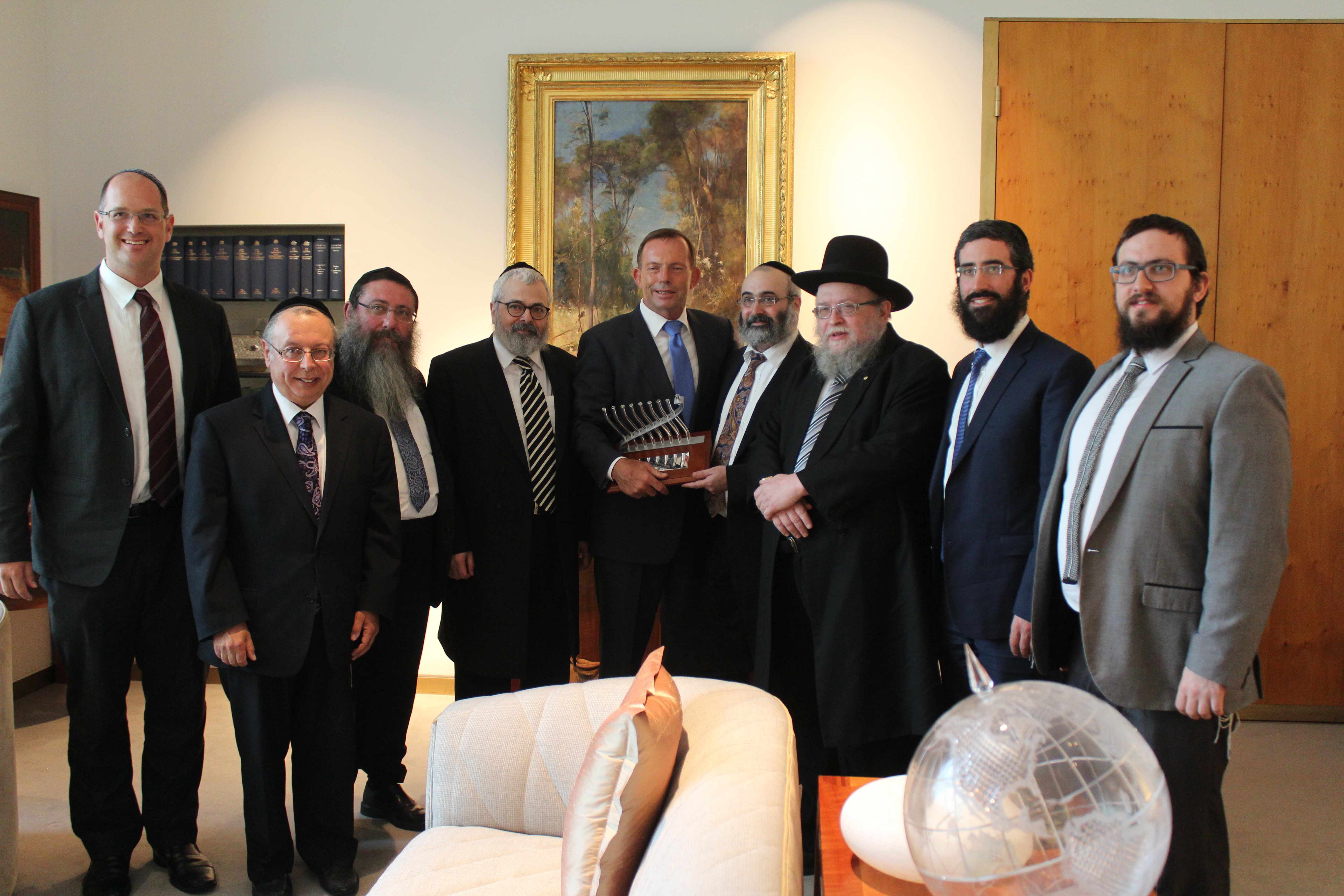 In the Rabbi's group picture with the Prime Minister from right to left: Rabbi Shmueli Feldman, Rabbi Yaakov Glasman, Rabbi Pinchus Feldman, Rabbi Meir Shlomo Kluwgant, Prime Minister The Honourable Tony Abbott MP, Rabbi Yehoram Ulman, Rabbi Moshe Gutnick, Rabbi Chaim Ingram and Rabbi Paul Lewin. 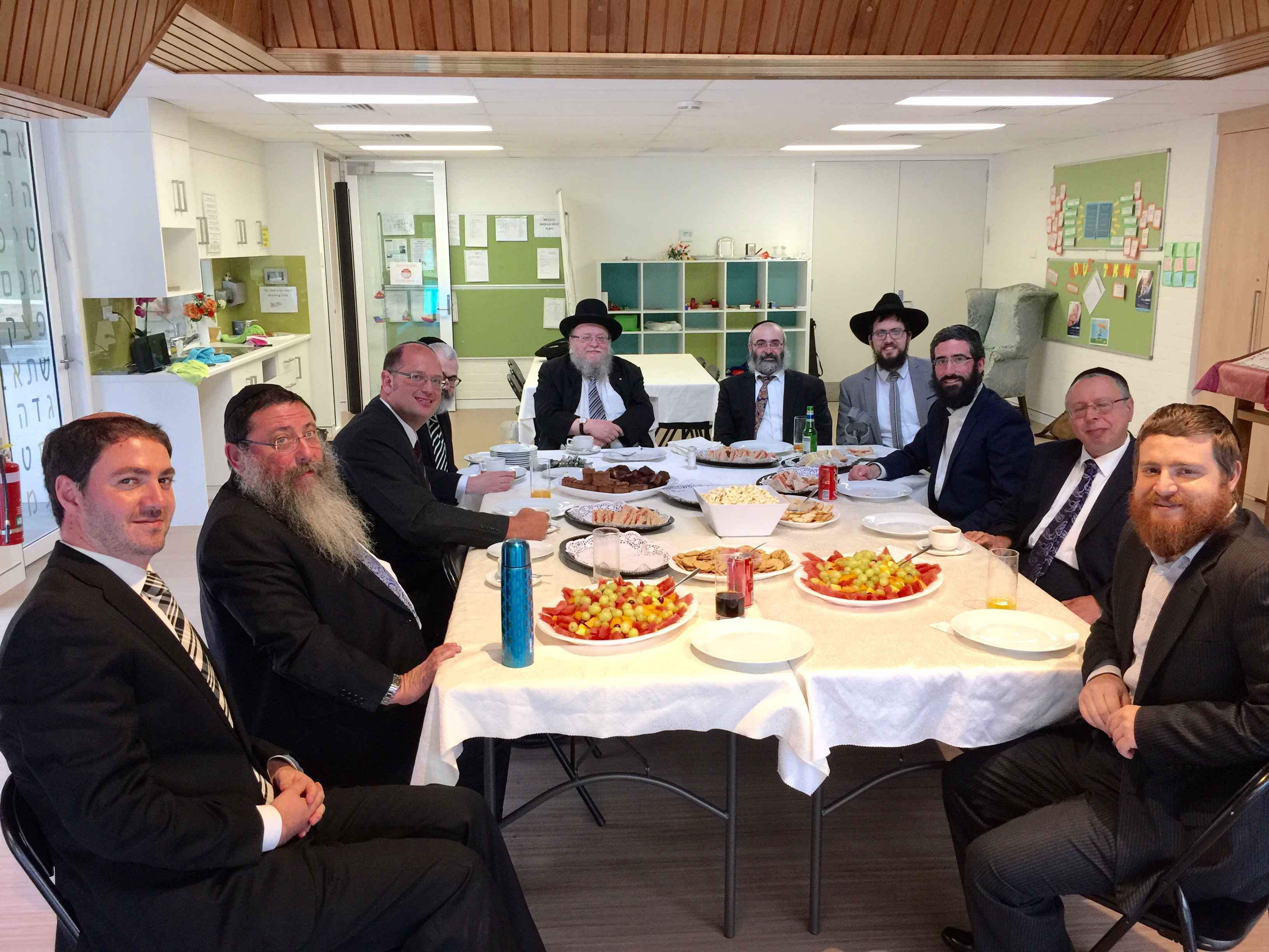 The Minyan of Rabbis who attended the lunch from right to left: Rabbi Zalman Raskin, Rabbi Chaim Ingram, Rabbi Yaakov Glasman, Rabbi Shmueli Feldman, Rabbi Meir Shlomo Kluwgant, Rabbi Pinchus Feldman, Rabbi Yehoram Ulman, Rabbi Paul Lewin, Rabbi Moshe Gutnick, Rabbi Alon Meltzer, 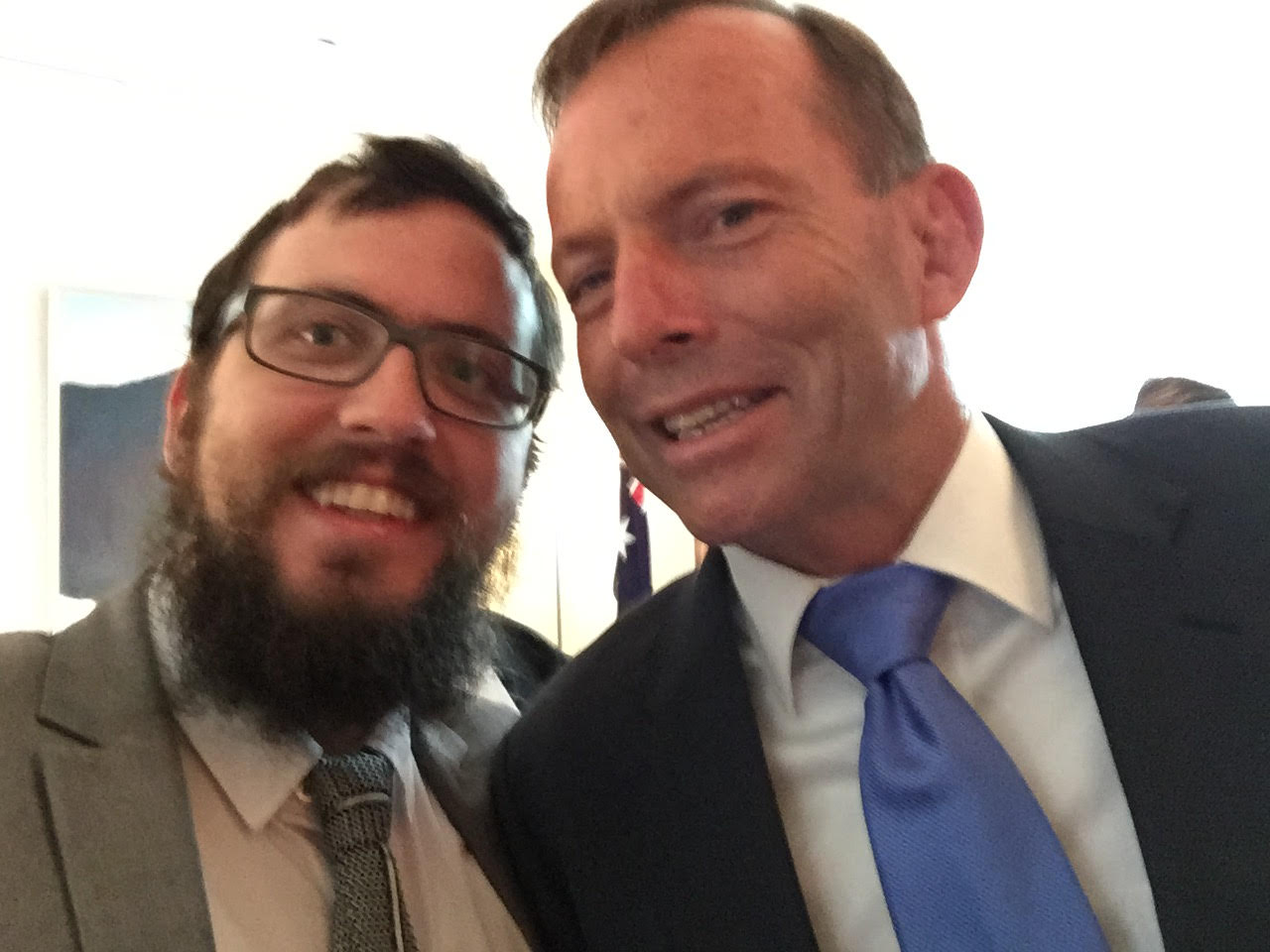 Rabbi Shmueli Feldman's post meeting 'selfie' 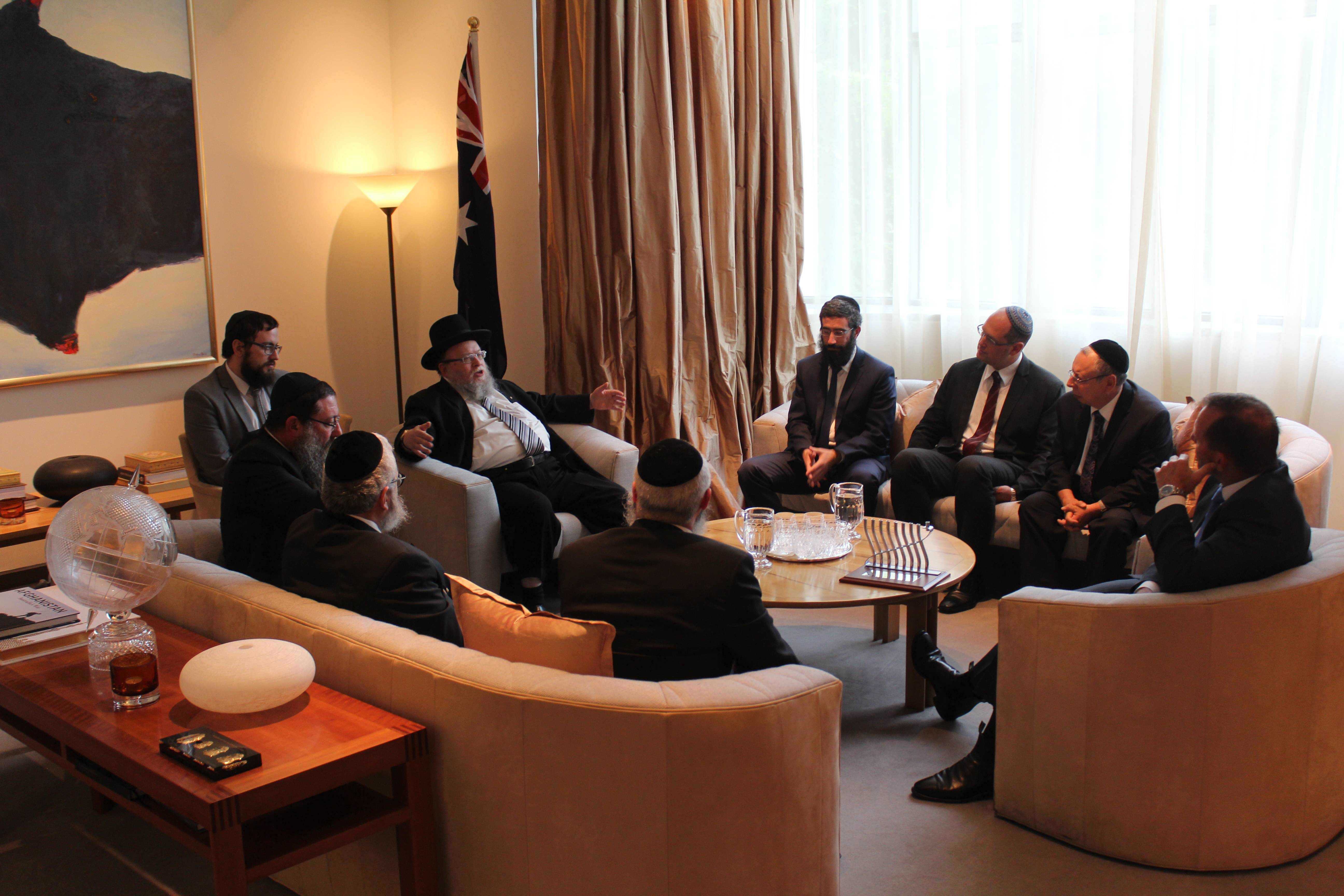 Photo of meeting in the Prime Minister's Office 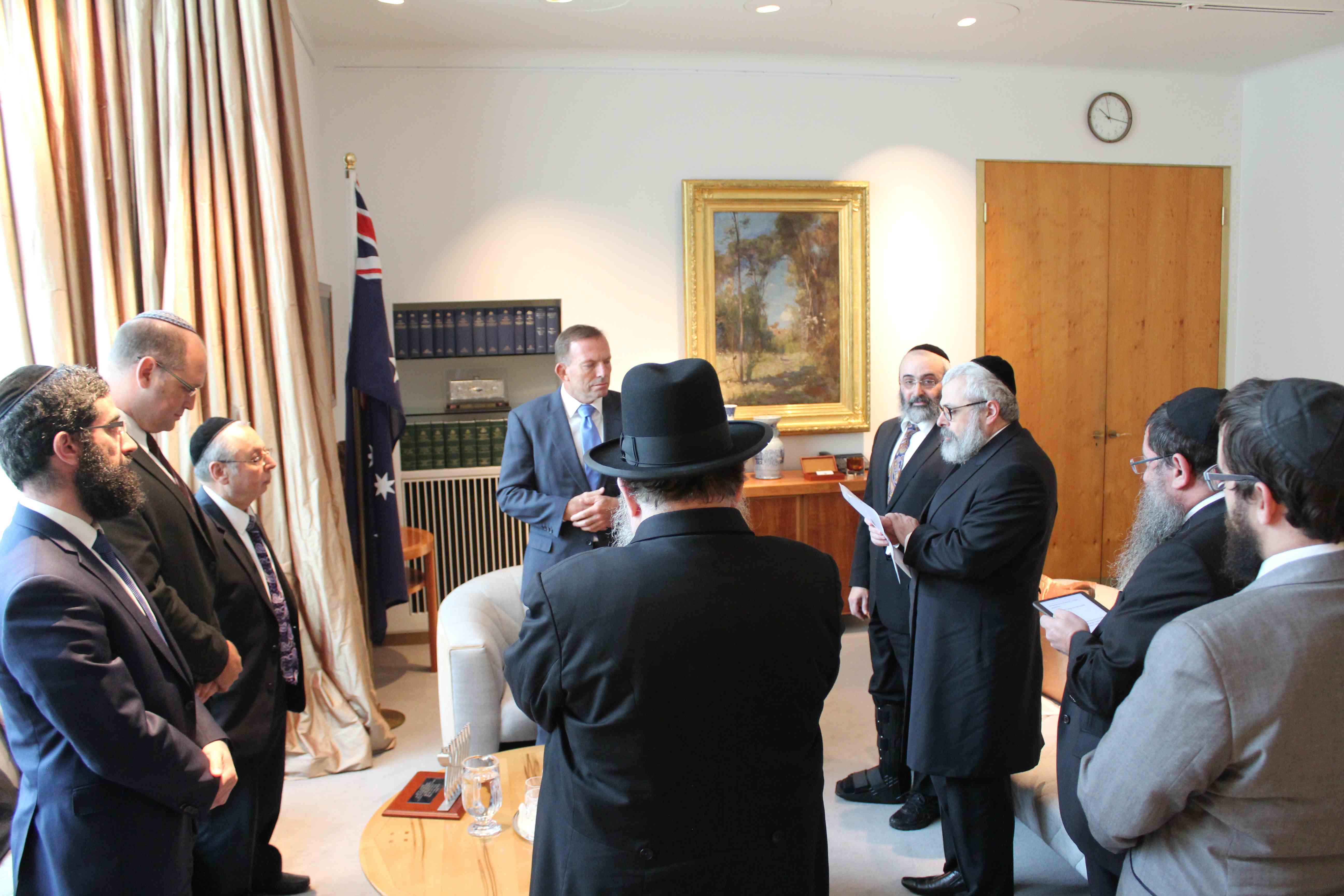 Rabbis Praying with the Prime Minister 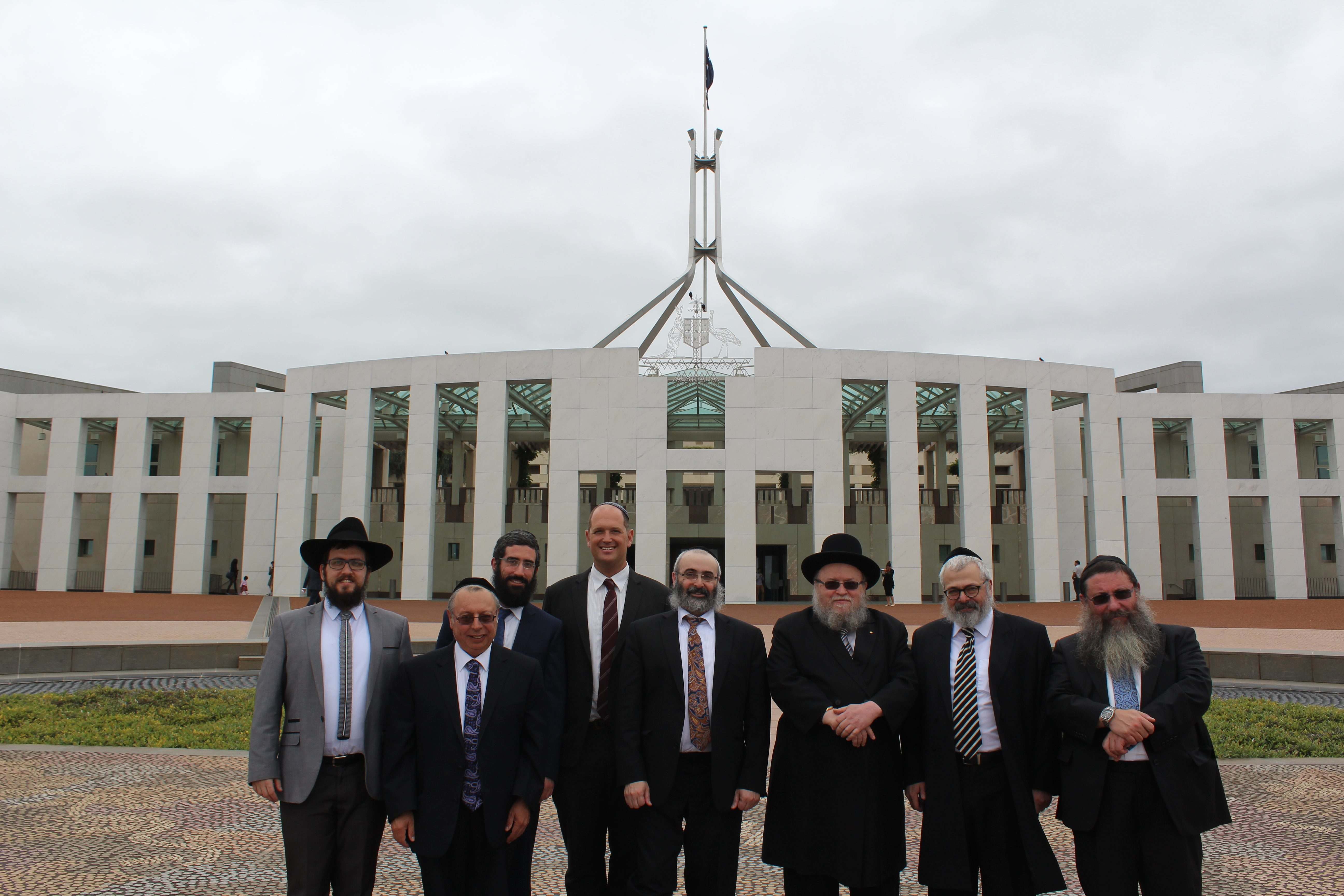 Rabbis Group Photo Outside Parliament House Photo credits; Sithu Tin-Aung. |
--

